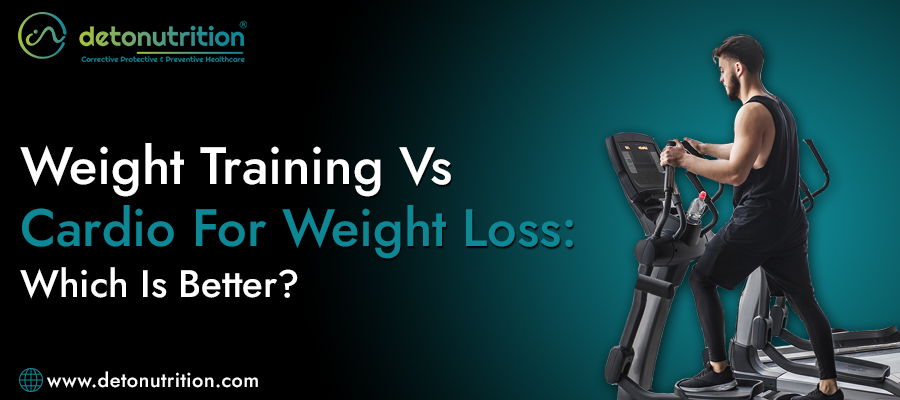Weight Training Vs. Cardio For Weight Loss: Which Is Better?
When it comes to weight loss, the age-old debate continues - is weight training or cardio more effective? Well, the truth is, both forms of exercise have their own unique benefits and can contribute to successful weight loss when combined with a healthy diet along with supplements. Cardio, like running or swimming, definitely helps you burn calories right there and then. It's like using up energy to fuel a fire. On the other hand, weight training builds muscle, which might not torch as many calories during the workout, but it keeps your metabolism working even when you're chilling on the couch. So, while cardio is like a quick burn, weight training is more like a slow, steady cooker for fat loss. Check out this blog to dive into the key differences between cardio and weight training for weight loss:
Read This Article - How Many Kg Can I Lose In 7 Days?
Cardio: An Amazing Exercise For A Quick Burn
Doing cardiovascular exercise or cardio is the secret weapon for burning calories and shedding extra pounds. By getting your heart pumping and breaking a sweat, you not only boost your metabolism but also improve overall health. Keep reading to know how incorporating cardio into your workout routine can transform your body and energize your life.
Following Are Some Benefits Of Doing Cardio:
1. Quick calorie burn
Cardiovascular exercise, or cardio, is renowned for its efficiency in burning calories. A moderately intense workout can lead to a calorie expenditure of anywhere between 250 to 350 calories in just a 30-minute session. The exact number burned depends on factors such as body weight, intensity, and the specific type of cardio performed. This makes it an excellent choice for individuals aiming to shed excess pounds.
2. Heart health boost
Beyond weight management, cardio offers substantial benefits for heart health. Regular engagement in cardiovascular activities helps strengthen the heart muscle, improving its pumping efficiency. This leads to enhanced blood circulation, lower blood pressure, and a reduced risk of heart disease, stroke, and other cardiovascular conditions. Additionally, cardio helps increase lung capacity and endurance, allowing you to perform physical activities with greater ease.
3. Temporary calorie burn
While cardio is highly effective at burning calories during the workout, it's important to note that the calorie-burning effects are primarily limited to the exercise session itself. Once the activity stops, the body's metabolic rate gradually returns to its baseline level. This means that cardio doesn't provide a sustained, long-term calorie burn. To maximize weight loss, it's essential to combine cardio with a balanced diet and potentially other forms of exercise, such as strength training, which can help boost metabolism even at rest.
Popular Cardio Options That You Can Try:
- Running/Jogging: Offers flexibility and can be done outdoors or on a treadmill.
- Swimming: Low-impact, full-body workout, ideal for joint-friendly exercise.
- Cycling: Enjoy the outdoors while getting a great workout, indoor or outdoor options.
- Dancing: Fun and energetic, various styles to choose from.
- Hiking: Combines exercise with nature, offers varying intensity levels.
Tips for Cardio Success:
- Avoid plateaus by trying different activities.
- Start slowly and gradually increase intensity and duration.
- Pay attention to signs of overexertion and rest when needed.
- Workout with a friend for motivation and accountability.
Weight Training: To Build Muscles & Burn Fat
Weight training is a powerful tool for shedding those extra pounds as well as building muscles. Lifting weights doesn't bulk you up but it sculpts your body and boosts your metabolism. By building lean muscle mass, you burn more calories even at rest. Want to know how weight training can transform your weight loss journey? Read on to know its benefits and practical tips to maximize its results.
Read This Article - How To Lose 1 Kg In A Week?
Benefits Of Weight Training
1. Muscle building
While weight training might not burn as many calories per session as cardio – typically around 130-220 calories in 30 minutes – its impact on muscle development is unparalleled. By progressively increasing the resistance you lift, you stimulate muscle growth and repair, leading to increased muscle mass over time.
2. Boost your metabolism
One of the most significant benefits of weight training is its ability to boost your metabolism. Muscle tissue is more metabolically active than fat, meaning it burns more calories at rest. As you build more muscle through weightlifting, your body's calorie expenditure increases, even when you're not exercising.
3. Long-term calorie burn
The increased muscle mass gained from weight training can lead to a substantial long-term calorie burn. Studies suggest that individuals with more muscle can burn an extra 50-140 calories per day compared to those with less muscle, even while at rest. This means weightlifting can help you maintain a healthy weight in the long run.
4. Preserve muscle during weight loss
When people embark on weight loss journeys, it's common to lose both fat and muscle. However, weight training plays a crucial role in preserving muscle mass during this process. By continuing to challenge your muscles, you can minimize muscle loss and maintain a higher metabolic rate, which is essential for effective and sustainable weight management.
Weight Training Tips
- Focus on compound exercises: Work multiple muscle groups at once (e.g., squats, lunges, push-ups).
- Progressive overload: Gradually increase weight or resistance to challenge your muscles.
- Proper form: Prioritize correct technique to prevent injuries.
- Rest and recovery: Allow muscles time to repair and grow.
Incorporating weight training into your fitness routine not only helps you build strength and tone your body but also offers significant metabolic advantages that extend far beyond the gym.
Weight Training Vs. Cardio For Weight Loss: Which is the Best?
For the best results, aim to combine both cardio and weight training along with balanced diet and organic weight loss supplements.
Balanced Diet: Fuel Your Body
Remember, exercise alone won't yield optimal results. A balanced diet is essential for weight loss and overall health. Focus on whole foods, including plenty of fruits, vegetables, lean proteins, and whole grains.
Read This Article - Reasons Why Am I Not Losing Weight
Organic Weight Loss Supplements: An Effective Approach
While some organic supplements may help in weight loss, their effectiveness and safety vary widely that’s why it's crucial to consult with a healthcare professional before trying any supplements. However, Detonutrition’s supplements are curated by the doctor itself, incorporating both ancient and modern technology using organic ingredients. Some common ingredients that are include in our herbal weight loss supplements are as follows:
- Green tea: Contains antioxidants and may boost metabolism.
- Garcinia cambogia: Helps to suppress appetite.
- Curcuma longa: Boosts metabolism and convert fat in to energy.
Other ingredients include cinnamomum zeylanicum, piper nigrum, zingiber officinale, country mallow etc.
Conclusion
Sustainable weight loss is a journey, not a sprint. Focus on creating healthy habits that you can maintain in the long run. Combining enjoyable cardio and strength training with a balanced diet is the key to achieving your goals. By combining cardio and weight training with a balanced diet; you'll not only lose weight but also improve your overall health and fitness. So, are you ready to get started?





